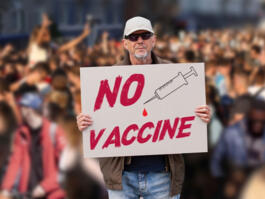Voters Reject ‘Great Reset’ Agenda
Business should focus on traditional goals like consumer service and profit, rather than the social justice and environmentalist agenda of the “Great Reset” movement, most voters believe.
A new Heartland Institute and Rasmussen Reports national telephone and online survey finds that 45% of Likely U.S. voters believe the highest priority for businesses should be providing individual consumers with high quality products and services at the lowest prices. Another 23% think businesses should prioritize providing good benefits and pay to employees, and 14% say earning a profit to benefit shareholders or owners should be the top priority. Only nine percent (9%) of voters think trying to stop climate change should be the top priority for business, and a mere one percent (1%) think using business resources to pursue social justice causes should be a top priority. (To see survey question wording, click here.)
The World Economic Forum has promoted the “Great Reset” movement as a global economic strategy in response to the COVID-19 pandemic that seeks to change the priorities of capitalism. Only 29% of voters are familiar with the Great Reset, while 44% say they aren’t familiar with the movement, and 27% are not sure. Of those familiar with the movement, a majority (52%) are opposed to the Great Reset, while only 21% say they Strongly Favor it.
A majority (53%) of voters don’t believe international institutions like the United Nations, World Economic Forum, and International Monetary Fund should be influential in creating regulations governing United States businesses. Only 11% believe such international organizations should be Very Influential in the creation of regulations, while another 26% believe international institutions should be Somewhat Influential.
(Want a free daily e-mail update? If it’s in the news, it’s in our polls). Rasmussen Reports updates are also available on Twitter or Facebook.
The survey of 1,016 U.S. Likely Voters was conducted on January 5, 2022 by the Heartland Institute and Rasmussen Reports. The margin of sampling error is +/- 3 percentage points with a 95% level of confidence. Field work for all Rasmussen Reports surveys is conducted by Pulse Opinion Research, LLC. See methodology.
While 76% of Democratic voters familiar with the Great Reset are in favor of the movement – including 43% who Strongly Favor it – the Great Reset is opposed by 76% of Republicans and 59% of voters not affiliated with either major party.
Similarly, 62% of Democrats believe international institutions like the United Nations, World Economic Forum, and International Monetary Fund should be at least somewhat influential in creating regulations governing United States businesses, but only 25% of Republicans and 24% of unaffiliated voters share that belief.
Politics also shapes voter opinions of business priorities:
– While 53% of Republicans and 48% of unaffiliated voters think the highest priority for businesses should be providing individual consumers with high quality products and services at the lowest prices, only 36% of Democrats agree.
– Thirty-three percent (33%) of Democrats think providing good benefits and pay to employees should be the top priority for business, a belief shared by only 17% of Republicans and 18% of unaffiliated voters.
– Thirteen percent (13%) of Democrats, but only five percent (5%) of Republicans and seven percent (7%) of unaffiliated voters, believe trying to stop climate change should be the highest priority for business.
Men (19%) are almost twice as likely as women voters (10%) to think earning a profit to benefit shareholders or owners should be the top priority for business. Women voters are significantly more likely than men to believe that business should prioritize either providing good benefits and pay to employees or trying to stop climate change.
Voters under 40 are much more likely than their elders to say they are familiar with the Great Reset movement. Among those who are familiar with the Great Reset, however, older voters overwhelmingly oppose the movement, while those under 40 favor it.
Among voters familiar with the Great Reset movement, 60% of whites, 26% of black voters, 54% of Hispanics and 51% of other minorities oppose the movement. Minority voters are more likely than whites to believe international institutions should influence the creation of regulations governing United States businesses.
College graduates and those with annual incomes of $100,000 or more are more likely to think profit should be the top priority for business.
Married voters are more likely than their unmarried counterparts to oppose the Great Reset movement.
President Joe Biden’s strongest supporters are most in favor of having international institutions create regulations for U.S. businesses. Among voters who have a Very Favorable impression of Biden, 65% believe international institutions like the United Nations, World Economic Forum, and International Monetary Fund should be at least somewhat influential in creating regulations governing United States businesses. By contrast, among voters with a Very Unfavorable impression of Biden, 65% think such international institutions should be Not At All Influential in creating U.S. business regulations.
While many voters have become skeptical toward the federal government’s response to the COVID-19 pandemic, a majority of Democrats embrace restrictive policies, including punitive measures against those who haven’t gotten the COVID-19 vaccine.
While a majority of Americans still think social media sites should permit free speech, most Democrats want companies like Twitter and Facebook to regulate content on their platforms.
Additional information from this survey and a full demographic breakdown are available to the public as well as Platinum Members.
Please sign up for the Rasmussen Reports daily e-mail update (it’s free) or follow us on Facebook. Let us keep you up to date with the latest public opinion news.
The survey of 1,016 U.S. Likely Voters was conducted on January 5, 2022 by the Heartland Institute and Rasmussen Reports. The margin of sampling error is +/- 3 percentage points with a 95% level of confidence. Field work for all Rasmussen Reports surveys is conducted by Pulse Opinion Research, LLC. See methodology.
Rasmussen Reports is a media company specializing in the collection, publication and distribution of public opinion information.
We conduct public opinion polls on a variety of topics to inform our audience on events in the news and other topics of interest. To ensure editorial control and independence, we pay for the polls ourselves and generate revenue through the sale of subscriptions, sponsorships, and advertising. Nightly polling on politics, business and lifestyle topics provides the content to update the Rasmussen Reports web site many times each day. If it's in the news, it's in our polls. Additionally, the data drives a daily update newsletter and various media outlets across the country.
Some information, including the Rasmussen Reports daily Presidential Tracking Poll and commentaries are available for free to the general public. Subscriptions are available for $4.95 a month or 34.95 a year that provide subscribers with exclusive access to more than 20 stories per week on upcoming elections, consumer confidence, and issues that affect us all. For those who are really into the numbers, Platinum Members can review demographic crosstabs and a full history of our data.
To learn more about our methodology, click here.





